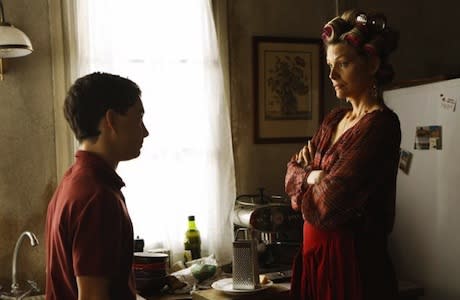Having produced and written a handful of thematically and structurally similar hyperbolized action films, Luc Besson finally takes his turn in the director's chair with The Family, reiterating his established formula of reactionary, violent American thinking finding its way onto French soil, where chaos unfolds.
Here, the specificity of the Western cowboy ethos driving the escapist polemics of the Taken films is eschewed in favour of a hybridization of several other mythical American tropes. Chiefly, the homogenization of violence within the context of a mob movie rooted in conservative familial morality.
Giovanni Manzoni (Robert De Niro), an archetypal mobster prone to bursts of emotionally-driven hostility, rats out his cohorts, landing himself and his family — wife Maggie (Michelle Pfeiffer), daughter Belle (Dianna Agron) and son Warren (John D'Leo) — in France in the Witness Protection Program. When we meet them, they're once again on the move, uprooted by a vaguely defined sticky situation likely stemming from their cyclic behaviour, wherein someone French does something annoying and they respond by kicking the crap out of them.
Their propensity for unleashing cold, gratuitous justice is, in itself, the point. Whether an inconsiderate plumber tries to rip them off or a classmate harasses or thieves from one of the kids, the externality of their rage doesn't impose on the sanctity of their insular family unit.
Though this sensory deadening, and indulgence of, id fantasy ideation does allow for occasional hilarity and base entertainment, Besson's handling of tone — trying to juggle so many satirical elements at once — never pans out. That the family is eventually sentimentalized is an issue as well. It's likely intended as irony or critical discourse, but since The Family vacillates wildly between cartoonish, inconsequential violent comedy and cold brutality, the aggression comes across as tepid and the comedy awkward and out of place.
Still, the garishness of it all, wherein Judeo-Christian morality is preached in an environment where the heroes are irrational sociopaths concerned only with their preservation and sense of rightness, has its own political implications. That they're Americans living in France — a country unrelated to their mobster ties and self-sustaining tendency to project their inner conflicts onto the world around them — is telling.
It's just unfortunate that this message has been rehashed by Besson and co. ad nauseam, much like the endless series of explosions and beatings that define this slipshod narrative.
(eOne)Here, the specificity of the Western cowboy ethos driving the escapist polemics of the Taken films is eschewed in favour of a hybridization of several other mythical American tropes. Chiefly, the homogenization of violence within the context of a mob movie rooted in conservative familial morality.
Giovanni Manzoni (Robert De Niro), an archetypal mobster prone to bursts of emotionally-driven hostility, rats out his cohorts, landing himself and his family — wife Maggie (Michelle Pfeiffer), daughter Belle (Dianna Agron) and son Warren (John D'Leo) — in France in the Witness Protection Program. When we meet them, they're once again on the move, uprooted by a vaguely defined sticky situation likely stemming from their cyclic behaviour, wherein someone French does something annoying and they respond by kicking the crap out of them.
Their propensity for unleashing cold, gratuitous justice is, in itself, the point. Whether an inconsiderate plumber tries to rip them off or a classmate harasses or thieves from one of the kids, the externality of their rage doesn't impose on the sanctity of their insular family unit.
Though this sensory deadening, and indulgence of, id fantasy ideation does allow for occasional hilarity and base entertainment, Besson's handling of tone — trying to juggle so many satirical elements at once — never pans out. That the family is eventually sentimentalized is an issue as well. It's likely intended as irony or critical discourse, but since The Family vacillates wildly between cartoonish, inconsequential violent comedy and cold brutality, the aggression comes across as tepid and the comedy awkward and out of place.
Still, the garishness of it all, wherein Judeo-Christian morality is preached in an environment where the heroes are irrational sociopaths concerned only with their preservation and sense of rightness, has its own political implications. That they're Americans living in France — a country unrelated to their mobster ties and self-sustaining tendency to project their inner conflicts onto the world around them — is telling.
It's just unfortunate that this message has been rehashed by Besson and co. ad nauseam, much like the endless series of explosions and beatings that define this slipshod narrative.
